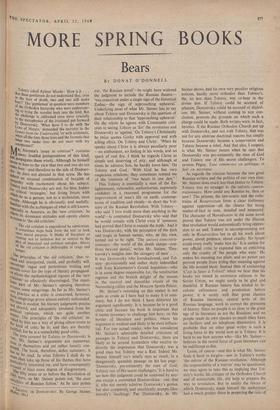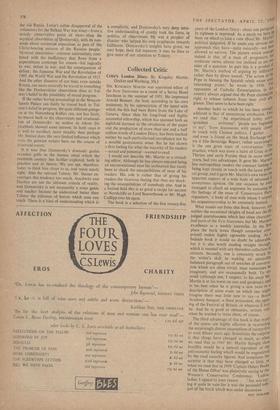MORE SPRING BOOKS
Bears
BY DONAT O'DONNELL Tolstoy asked Aylmer Maude : 'How is it . . . that these gentlemen do not understand that, even In the face of death, two and two still make four?' The 'gentlemen' in question were members of the Orthodox hierarchy who were endeavour- ing to bring the novelist back into the fold. But the challenge is addressed even more crucially to the metaphysics of the irrational put forward nY Dostoevsky. 'What have I to do with the Laws of Nature,' demanded the narrator in the Letters from the Underworld, 'or with arithmetic, twice all the time those laws and the formula that mice two make four do not meet with my IteeePtancer MIL STEINER's 'essay in contrast'* contains and InanY fruitful juxtapositions of this kind, Propagates them wisely. Although he himself rrTms to lean to the view that two and two do not skakeb feur—,and therefore to the side of Dostoev- iticl--he does not abound in that sense. He has %,,,eecl an unusual combination of breadth of To thy with excitement about his subject. for'cY and Dostoevsky are not, for him, fodder wt,,,.,. critical `strategies,' but living forces with wr'en he as a person, not as a technician, must fa,es,t,le. Although he is obviously, and usefully, really with the techniques of what is still known, reallY m America, as the 'new criticism,' he to '. ,s its dominant attitudes and. openly claims elan' to 'the old criticism.'
The old criticism is engendered by admiration. It sometimes steps back from the text to look trtlinmoral purpose. It thinks of literature as , g not in isolation but as central to the Play of historical and political energies. Above all the old criticism is philosophic in range and .
vi„ c Principles of `the old criticism,' thus re- e,ed and interpreted, could, and probably will, tsq_ccurage vague and pretentious writing and pt vide cover for the type of literary propagand- criaW,IMila the methodological rigours of the `new re371sth' so effectively discouraged. The mani- ar,„° Part of Mr. Steiner's opening therefore ow-'ses some misgivings. As far as Mr. Steiner's the Practice as a critic is concerned, however, misgivings prove almost entirely unfounded. ailds tone is modest, his literary judgments precise popshreWd, and adequately insulated from his matte opinions, which are quite another voC,,r• The principles of 'the old criticism' in- the `,.`L. oy him are a way of giving elbow-room to just."ad of critic he is; and they are thereby 1,4,_"ed, for he is a remarkably good critic. va;41.1e area covered by Tolstoy or Dostoevsky is clot' themselves h einer's arguments are numerous, M s and yet rather loosely con- lia7c. The book, therefore, defies summary; it 111' to be read. In what follows I shall do no pa°,..re, than take up those of his themes that have ar,eularly interested me, and have consequently `d at least some degree of disagreement. The e fifty years or so before the Revolution of Hu,. were, as Mr. Steiner points out, 'the anni abiles of Russian fiction.' As he also points
(4i "rort.S3T) OR DOSTOEVSKY. By George Steiner.
temper. out, 'the Russian novel'—he might have widened the judgment to include the Russian theatre— `was conceived under a single sign of the historical Zodiac—the sign of approaching upheaval.' Underlying most of what Mr. Steiner has to say about Tolstoy and Dostoevsky is the question of their relationship to that 'approaching upheaval.' On the whole he agrees with Communist criti- cism in seeing.Tolstoy as 'for' the revolution and Dostoevsky as 'against.' On Tolstoy's Christianity he, twice quotes Gorky with approval and with telling effect. On Tolstoy and Christ : 'When he speaks about Christ it is always peculiarly poor —no enthusiasm, no feeling in his, words, and no spark of real fire. I think he regards Christ as simple and deserving of pity; and although at times he admires him, he hardly loves him.' On Tolstoy and God : 'With God he has very suspicious relations; they sometimes remind me of the relations of "two bears in one den." '
This Tolstoy is essentially a man of the En- lightenment, rationalist, authoritarian, supremely confident in a reasoned programme for the improvement of man's life on earth, contemp tuous of tradition and• rituals—in short the Vol: taire of the Russian Revolution. With Tolstoy- who said 'I love truth more than anything in the world'—is contrasted Dostoevsky who said that he would remain with Christ even if 'someone had proved that Christ is outside the truth.' And it was Dostoevsky, with his perception of the dark and tragic in human nature, who, on this view, turned out to be right. The univers concentra- tionnaire—the world of the death camps—con- firms beyond denial,' writes Mr. Steiner, 'Dos- toevsky's insights into the savagery of men' . . . It was Dostoevsky who foreshadowed, and Tol- stoy—provisionally and rather shyly indentified with Ivan Karamazov's Grand Inquisitor—who is in some degree responsible for, the totalitarian regimes and the brutish delight of the masses in the musical and dancelike rituals of the Nuremberg rallies and the Moscow Sports Palace.
Mr. Steiner's reasoning on this matter is not quite as crude as I have had to make it in sum- mary, but I do not think I have distorted his argument significantly. It is because he is a good critic and because his book is important that it seems necessary to challenge him here, on this border of literature and politics, where his argument is weakest and likely to be most influen- tial. For one actual reader, who has considered Mr. Steiner's admirable detailed criticisms of passages in Tolstoy and Dostoevsky, there are likely to be several bystanders who receive in- directly the impression that Dostoevsky was a good man but Tolstoy was a Red. Indeed Mr. Steiner himself very nearly says as much, in a dangerously quotable passage on his last page : `Dostoevsky, pre-eminently the man of God; Tolstoy one of His secret challengers.' It is hard to see how this judgment could be sustained by any- one except a committed Dostoevskian : one, that is, who not merely admires Dostoevsky's genius, but also completely and uncritically accepts Dos- toevsky's teachings. For Dostoevsky, as Mr. Steiner shows, had his own very peculiar religious notions, hardly more orthodox than Tolstoy's. He, no less than Tolstoy, was co-bear in the divine den. If Tolstoy could be accused of atheism, Dostoevsky could be accused' of diabol- ism. Mr. Steiner, without coming to any con- clusion, presents the grounds on which such a charge could be made. Both writers were, in fact, heretics. If the Russian Orthodox Church put up with Dostoevsky, and not with Tolstoy, that was not for any abstruse doctrinal reasons but simply because Dostoevsky became a conservative and Tolstoy became a rebel. And that also, I suspect, is what Mr. Steiner means when he says that Dostoevsky was pre-eminently the man of God and Tolstoy one of His secret challengers. To reverse Peguy, Tour commence en politique et fink en mystique.
As regards the relation between the two great Russian writers and the politics of our own time, Mr. Steiner does much less than justice to Tolstoy. Tolstoy was no stranger to the Univers conceit- trationnaire. How could any Russian be, then or now? The prisons, the law-courts and the exile- trains of Resurrection form a clear testimony against oppression—all the clearer for being matter-of-fact in tone, detailed and measured. The character of Novodvorov in the same novel proves that Tolstoy was not under the illusion that revolution would automatically bring oppres- sion to an end. Tolstoy is uncompromising not only in Resurrection but in all his work about power, about pretence, about cruelty. No tyrant could every really 'make him do.' It is useless for any official critic to expound him as criticising only the cruelty of 'the people who were.' He makes his meaning too plain, and no power can prevent people from trying that meaning against the life around them Instead then of exclaiming 'C'est la Mute a Tolstoi!' when we hear that his books are issued in enormous editions in the Soviet Union, we ought surely to be glad and thankful. If Russian history has tended to in- culcate callousness and prostration before power, it is surely well that great classics of Russian literature, central texts of the Russian language, work to correct the pressures of history. Since no people is so close to the great age of its literature as are the Russians, and no people reads its own classics so much (they have no thrillers and no telephone directories), it is probable that no other great writer is such a living force in the world now as is Tolstoy. It is hard to see how anyone who—like Mr. Steiner— believes in the moral force of great literature can be indifferent to this.
Lenin, of course—and this is what Mr. Steiner finds it hard to forgive—saw in Tolstoy's works `the mirror of the Russian revolution.' Although the responsibility of a 'mirror' may be questioned, we may agree to take this as implying that Tol- stoy's works, his critique of the Orthodox Church and of aristocratic life, did help to prepare the way to revolution. But in reality the forces of which Dostoevsky made himself the spokesman had a much greater share in preparing the ruin of the old Russia. Levin's sullen disapproval of the volunteers for the Balkan War was wiser—from a strictly conservative point of view—than the mystical chauvinism of Dostoevsky, with its non- sense about territorial expansion, as part of 'the Christ-bearing mission of the Russian people.' Mystical chauvinism—extreme nationalism, com- bined with the inefficiency that flows from a superstitious contempt for reason—led logically to war, defeat in war, and the consequences of defeat : the Japanese War and the Revolution of 1905, the World War and the Revolution of 1917. And the other disasters of our time, even outside Russia, can more naturally be traced to something like the Dostoevskian chauvinism than to Tol- stoy's belief in the possibility of moral progress.
If the rather boring proceedings in the Moscow Sports Palace can fairly be traced back to Tol- stoy's belief in progress, the quite different goings- on at the Nuremberg Rallies can, not less fairly, be traced hack to the chauvinism and irrational- ism of Dostoevsky an author in whom Dr. Goebbels showed sonic interest. In both cases it is well to recollect, more steadily than perhaps Mr. Steiner does, the very limited influence which even the greatest writers have on the course of historical events.
It is true that Dostoevsky's dramatic genius revealed gulfs in the human mind which the twentieth century has further explored, both in practice and in theory. We are apt, therefore, today to think him closer to us. and 'more nearly right,' than the rational Tolstoy. Mr. Steiner en- courages this tendency too much. Auschwitz and Dachau are not the ultimate criteria of reality, and Dostoevsky is not necessarily a wiser guide and teacher because he understood better than Tolstoy the extremes of horror which man can reach. There is a kind of understanding which is a complicity, and Dostoevsky's very deep intui- tive understanding of cruelty took the form, in politics, of chauvinism. He was a prophet of disaster who helped his own prophecies towards fulfilment. Dostoevsky's insights have given, we may hope, their full measure; it may be time to give more of our attention to Tolstoy.











































 Previous page
Previous page